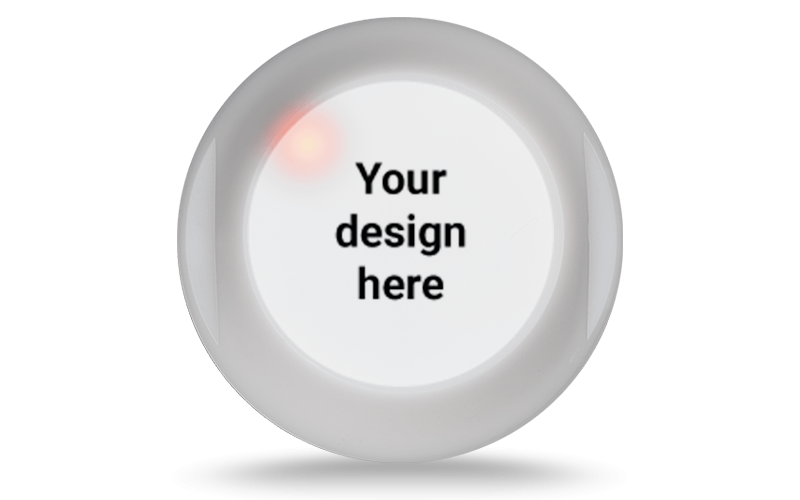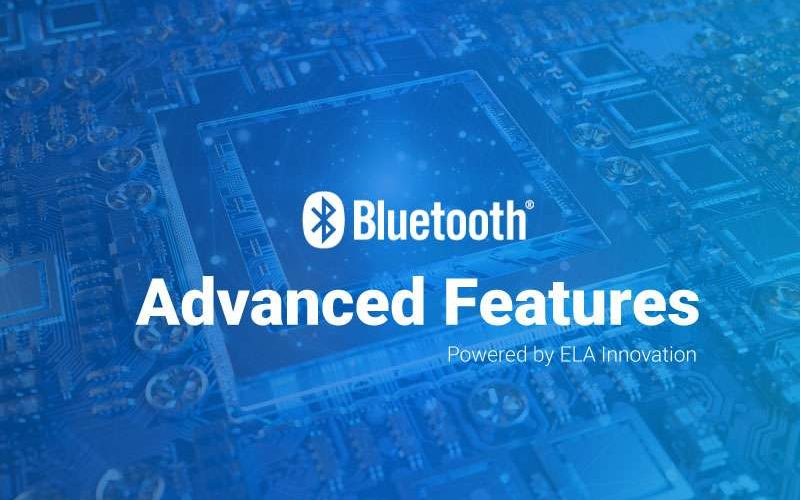![]() Ultra-rugged Bluetooth beacons and IoT sensors
Ultra-rugged Bluetooth beacons and IoT sensors
Bluetooth Beacon
Discover our wide range of Bluetooth beacons dedicated to industrial IoT solutions.
Our full selection of Bluetooth beacons
As industrial Bluetooth beacon manufacturer, ELA Innovation offers a wide range of ble beacons of different shapes to cover many applications.
Recognized for their robustness and high autonomy, ELA Innovation’s identification beacons are perfectly adapted to harsh environments such as construction sites, industrial sites or even logistics and transportation.

Blue COIN ID
Small equipment identification
Ø 36mm – 5 years battery life
Indoor and outdoor use

Blue LITE ID
Small equipment & people identification
Replaceable battery – 5 years battery life
Indoor and outdoor use
NEW

Blue LITE TOUCH
Driver and passenger identification
Push-button for status change – Replaceable battery
Indoor and outdoor use

Blue PUCK BUZZ
Large equipment identification
LED & BUZZER – 18 years battery life
Indoor use

Blue PUCK ID
Large equipment identification
IP68 -IP69K – 20 years battery life
Indoor and outdoor use
All our Bluetooth beacons are compatible with iBeacon and Eddystone protocols.

What is a bluetooth beacon?
A bluetooth (ble) beacon is a very small object, a small physical box, beloning to the large family of connected object known as Internet Of Things (IoT for short). This beacon is a transmitter that uses Bluetooth wireless communication technology.In the case of industrial beacons, the technology used is often Bluetooth Low Energy (BLE).

A beacon bluetooth is composed of a case of a few centimeters in diameter, containing a battery and an electronic board on which we find among others a microcontroller, a radio module, an antenna and various sensors.
Technically speaking, the Bluetooth Beacon emits at a regular frequency and at a certain power signals (RSSI), defined as radio waves that can be read by devIces wIth bluetooth connectivity such as smartphone, a tabket or a ble gatewat that most often acts as a scanner.
The beacon bluetooth will transmit data thanks to those radio waves. But, unlike “consumer” Bluetooth devices such as speakers, headphones or connected watches, the main function of a beacon is the transfer of small data. Indeed, beacons will be able to transmit data such as an ID number or a battery level, but they will not be able to transmit music or images.

What is a ble beacon is used for?
Democratized since 2013, the Bluetooth (ble) beacon is a fast-growing market driven by the digitalization of companies’ industrial processes.
Initially, this connected beacon was mainly used in the retail sector, allowing retailers to push promotional content to consumers in the form of push notifications. Its use has quickly spread to more industrial fields by integrating with the development of Industry 4.0.
Automation of low value-added tasks, predictive data analysis, operations management, are major challenges for industrial companies seeking to optimize their performance.
The Ble beacon is ideal to accompany companies in this digitalization. This wireless beacon allows for automatic identification and tracking of equipment and spare parts. This beacon can also be used for hands-free access control to secure buildings.
How do bluetooth le beacon work?
In practice, to function, a Bluetooth LE beacon is integrated into a network infrastructure consisting of a transmitter (the beacon), a Bluetooth receiver (smartphone, tablet, PC, gateway, etc.), a back-end and an application.
When a Bluetooth beacon enters the detection zone of a receiver, it will be detected by it. The beacon will then emit data (in hexadecimal) composing a frame. This raw data will then be interpreted by a back-end or other element of a software solution, and retranscribed to the business application in the form of dashboards or location points.
This will allow to trigger actions, such as sending notifications or alerts that will be received by the user via the cloud/server of the company.
How to set up our Bluetooth Beacon?
ELA Innovation has developped a large variety of accessories, making the installation and use of their ble beacons ultra simple and fast. The different fastening systems are secured for industrial use without the risk of the beacon becoming detached.
Pour les produits au format PUCK et COIN, il existe des supports multi-fixation appelés respectivement PUCK Holder Sticker et COIN Holder Sticker.
Ces accessoires sont composés d’un support de beacon, d’un adhésif double-face haute performance, d’un locker et d’une vis de sécurité à empreinte TORX. Le locker et la vis permettent de sécuriser le beacon dans son support. Cela est particulièrement adapté pour une utilisation pouvant engendrer des chocs ou des vibrations.
Grâce à leur système multi-fixation, les PUCK et COIN peuvent être installés de 3 façons différentes sur de nombreuses matières (béton, bois, plastique, métal, etc.) :
- Collés grâce à l’adhésif double-face
- Vissés par 2 vis
- Attachés par collier de serrage en nylon
Les boîtiers LITE et SLIM peuvent être collés sur des surfaces lisses grâce à leur adhésif industriel double-face, pour une utilisation en intérieur. Ils peuvent également être attachés en format porte-clés.
Le boîtier format AERO peut être fixé de 3 façons différentes :
- Collé grâce à l’adhésif double-face
- Vissé par 2 vis
- Attachés par collier de serrage en nylon
Expand your Bluetooth beacon knowledge
What is Bluetooth Low Energy?
Bluetooth Low Energy (BLE) or Bluetooth smart, is a variant of Bluetooth known as “classic”. This wireless communication protocol operates on the 2.4GHz radio frequency. But, really, what is the difference between these two versions?
The main difference between Bluetooth and Bluetooth Low Energy is the low energy consumption of the latter, due among other things to the amount of data transmitted. This technical specificity makes it possible to considerably extend the autonomy of connected objects by reducing their activity time.
Because of its operation mode, Bluetooth Low Energy seems to be more adapted to industrial uses. Indeed, the majority of industrial use cases do not require too high a recurrence of transmission, nor the transmission of a large amount of information. Therefore, Bluetooth Low Energy will be perfectly adapted for the transmission of data such as temperature, luminosity, a movement threshold, an identifier or a time.
In addition, unlike traditional Bluetooth, BLE does not require a master/slave pairing to operate, making it easier to use on a large scale.
What frequency does a Bluetooth beacon transmit at?
A BLE beacon transmist at regular intervals in order ot be detected by receivers (scanners) in the vicinity. This transmission interval is measured in utis of time and ranges from 20 milliseconds to 10.24 seconds. This interval can be configured according to the needs.
For instance, to use a Bluetooth Beacon from ELA Innovation in “connected” mode and to be able to send it a command such as “turn on the LED” or to configure it, it is recommended to have a fast interval espcially if the density of beacons in the vicinity is high. Indeed, the time out of the BLE scanner is 3 seconds, if in this time, the scanner has managed to detect and connect to the beacon it targets, it may abandon its search or take several minutes before it manages to connect to it.
Nevertheless, the frequency of emission of a beacon will play on the autonomy of the latter. Indeed, the shorter the intervals, the more energy the beacon will consume to transmit. It is therefore important to choose the most appropriate interval according to the need, in order to optimize the life of its battery.
Some beacons are equipped with a 3-axis accelerometer allowing to vary the emission frequency according to the beacon’s state: higher emission rate if the beacon is moving and slower rate if the beacon is stationary.
What is the range of a Bluetoot beacon?
The transmission range of a BLE tag is the distance up to which the beacon signal can be picked up by nearby Bluetooth scanners. In general, BLE technology offers a higher transmission range than RFID or NFC technology. However, this distance may vary depending on the environment in which the beacon is located. Indeed, in free field (i.e. outside without obstacle) the range of a Bluetooth Low Energy beacon can reach several hundred meters. In an industrial environment often containing many metal objects, the reflection of radio waves can reduce the transmission range to a hundred meters.
It is important to note that several factors can play on the range of a BLE beacon in addition to its environment. The strength of the RSSI signal of the beacon and the reception rate will contribute to the good transmission of data. Hence the importance of choosing a beacon adapted to the uses and needs.
Frame formats: iBeacon and Eddystone, what's the difference?
Defined by the Bluetooth SIG (the consortium behind Bluetooth), the Bluetooth Low Energy frame is a sequence of hexadecimal values of 31 bytes in which we find different data such as the beacon’s identification number (UUID), the sensor data, its battery level or the strength of the RSSI signal.
Apple, Google and many beacon manufacturers such as ELA Innovation, have developed their own Bluetooth Low Energy frame format from this base.
The frame format standardized by Apple released in 2013, known as iBeacon allows for easy integration of BLE beacons into iOS applications. The iBeacon frame transmits 3 pieces of information to identify the beacon: a general identifier called UUID (16 bytes long), an identifier corresponding to the group of beacons (sign location) called “major” and finally the beacon’s own identifier called “minor” to differentiate it from other transmitters nearby.
The Eddystone format released two years later and created by Google, is an open-souce protocol to facilitate the development of mobile applications. The particularity of the Eddystone format is the possibility to transmit a URL directly to a device, without having to create a mobile application, which simplifies even more its use.
Although the iBeacon format was initially developed for iOs smartphones and the Eddystone format for Android smartphones, both protocols are now cross-platform.
Resources

Custom setting & white label configuration
With the “Custom Settings” service, you can customize certain settings for your products, such as the advertising period, tag IDs, transmission power, etc. To customize your labels and add your logo, choose the “Custom Label” service.

Bluetooth Advanced Features
Thanks to the Bluetooth Advanced Features option, you will accelerate the deployment of your business solution and guarantee your customers’ satisfaction. This service allows you to customize 100% the frame of your ELA Innovation beacons & sensors. The configuration is done by our factory teams.

IoT Blog
Discover our IoT Blog dedicated to technological innovations. Here you can expand your knowledge of wireless communication technologies and discover the many worlds in which our products are used.

